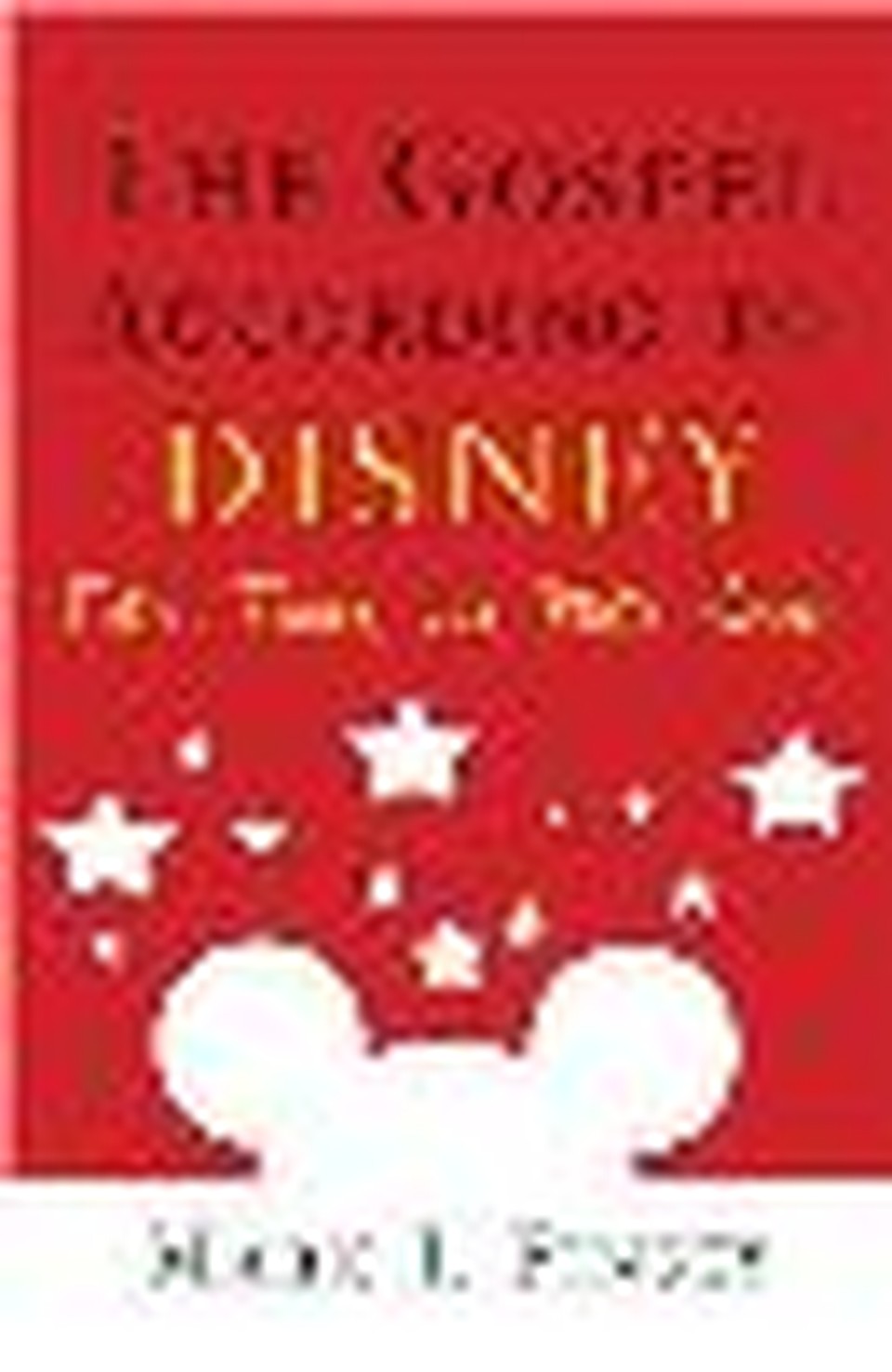The Cross & the Pen: "The Gospel According to Disney"

Welcome to "The Cross & the Pen," Crosswalk.com's author-to-author interview column.
I met Mark Pinsky a year or so ago when, as a journalist with The Orlando Sentinel, he called, asking about interviewing me concerning my three novels. I’d heard of him, of course. Everyone who is anyone in the writing world (and especially in this area) had heard of him. He’s known — if for nothing else — because of his book "The Gospel According to the Simpsons." A month ago, I ran into Mark at a bookseller’s convention. He told me about his latest work, "The Gospel According to Disney" (Westminster), and I said, “Hey! This time it’s my turn to interview you!” So, we got together not too long ago to chat about the book. Wanna listen in?
Eva: Mark, you and I both live in Central Florida-"Home of the Mouse"-so I can certainly imagine where you came up with the idea for the book. But, something tells me it goes deeper than frequently driving past the Disney compound on I-4.
Mark: Actually, it predates my move to Central Florida in 1995. Before that I worked for the Los Angeles Times in Orange County, and our family lived about 35 minutes from Disneyland. We took our young children to the park quite often. But the idea for the book came from our little den in Long Beach, Ca., watching Disney videos with my kids, who were then toddlers. Some things I saw I liked, like concern for others and their feelings, and tolerance for differences. Other things I didn't, like racial and ethnic stereotypes that were products of their times.
Eva: Before we talk about some of the movies and the book and the different ways the book can be used, let's talk a bit about the Disney brothers. We all know Walt, but I think Roy gets lost in the shuffle sometimes. Who were these boys and how is it they grew up to enchant us with their method of storytelling?
Mark: In many ways the two youngest Disney brothers, who were close all their lives, were shaped by their times and place, early 20th century, middle America. They were also strongly influenced by their father, Elias Disney. Although they respected and honored him all their lives, he was at times an abusive parent. His imposition of what we would today call rigid fundamentalism turned his sons away from organized religion. Their dismal home life, I think, also turned them toward fantasy and storytelling as a means of escape.
Eva: Did Walt Disney want religion in his movies?
Mark: No. In nearly seven decades of animated feature films, there is very little in the way of explicit Judeo-Christian symbolism, or the words God or Jesus. Walt believed that making films reflect sectarian values would limit his market around the world. Thus, the preferred agent of supernatural intervention is magic, which is universal.
Eva: But you'll often hear the words "faith, believe, miracle, blessing, sacrifice, and divine" within the animated features ...
Mark: That's an interesting contradiction. There is, without question, a strong theological vocabulary. The Disney gospel is about faith in non-specific, non-sectarian faith. Faith is the important element, not the content of the faith. Plus, good is always rewarded; evil is always punished.
Eva: Let me clear up something. Before anyone thinks you're giving the "Gospel Story" (or the story of the life and ministry of Jesus) per se, what does the word "gospel" literally mean and how are you using it in your title?
Mark: I mean the word generically, a body of faith and values, and not in the traditional Christian sense.
Eva: Beginning with Chapter Three, you list a few of Disney's animated films, give a rundown of the plot, and then show the reader biblical correlations. Let's talk about a few of those. Of course, I don't expect great details, but what can we learn from, say, "Snow White and the Seven Dwarfs"?
Mark: From Snow White's stepmother, that vanity and jealousy are self-destructive sins that can lead to even greater evil. From Snow White herself, the acceptance of the dwarfs as human beings worthy of respect. From the dwarfs, hospitality and the willingness to risk their own well-being to protect a persecuted fugitive, which I compare to hiding Ann Frank in Nazi-occupied Holland during World War II. Also, in a rare instance, Snow White prays that Grumpy will like her, and that prayer is answered.
Eva: What about – and this is almost the same title, just different words (laughing) – "Beauty and the Beast"?
Mark: That people should not be judged by their appearance, either positively or negatively. That people can be transformed, be redeemed.
Eva: Mark, the Disney studios and theme parks have been under great attack over the past few years. Of course, Walt and Roy are no longer with us and, granted, things do look a bit shaded in gray. In spite of all that, is the message from the movies still the same?
Mark: The messages are essentially the same – believe in something, be optimistic, be tolerant of the failings of the others. But there is more religious diversity, and more acceptance of other belief systems as equally valid to the Judeo-Christian tradition. So, in these features there are representations of animism ("Pocahantas"), Confucianism ("Mulan"), Hinduism ("Lion King") and Shamanism ("Brother Bear"). This has been a disturbing development for some orthodox and traditional believers.
Eva: Does this mean that Christians should keep their children away from these movies, or use them as teaching tools?
Mark: I would say, use discernment. Try to determine what your child can assimilate in the movie, without undermining your faith and values. What is their understanding of "make-believe?" So, in the case of "Brother Bear," you might say, "This is make-believe. It takes place before Jesus came."
Eva: Good point. Okay, finally, can we clear up a little something? Are there subliminal messages in movies like "The Lion King" and "Aladdin"?
Mark: No, Eva, that has been thoroughly investigated by respectable Disney critics and rejected. However, there is a reason why the charge was taken seriously. In the early years, when most of the Disney artists were single young men, they would relieve some of the boredom of drawing so many similar frames by sneaking in the occasional naughty one, according to the late Ward Kimball. But it was nothing demonic or pornographic.
Eva: Do you have a vision for how readers – especially parents – can use your book to teach their children faith and values?
Mark: My hope is that they will read each of the short essays on the features before they rent or buy them for their children or grandchildren. Then, they can decide whether or how to watch them with the kids. These movies can provide a wonderful opportunity to begin serious discussions about faith and values.
Eva: Mark, I always ask the one being interviewed to lift up a short prayer at the end of the interview. Would you pray for our next generation of moviegoers?
Mark: I put it this way, in both my books about "The Simpsons" and Disney: You can find God in the funniest places, and where you least expect it. In popular culture, as in life, seek and ye shall find.
Mark Pinsky is religion reporter for the Orlando Sentinel, author of the best-selling book "The Gospel According to the Simpsons," and coauthor of its companion study guide, "The Gospel According to the Simpsons Leader’s Guide." His writing has appeared in Christianity Today, the New York Times, the Boston Globe, and the Nation. He is a sought-after speaker at colleges, universities, and churches on the topic of religion and popular culture. For more information about Mark Pinsky, go to www.markpinsky.com.

Originally published August 07, 2004.




